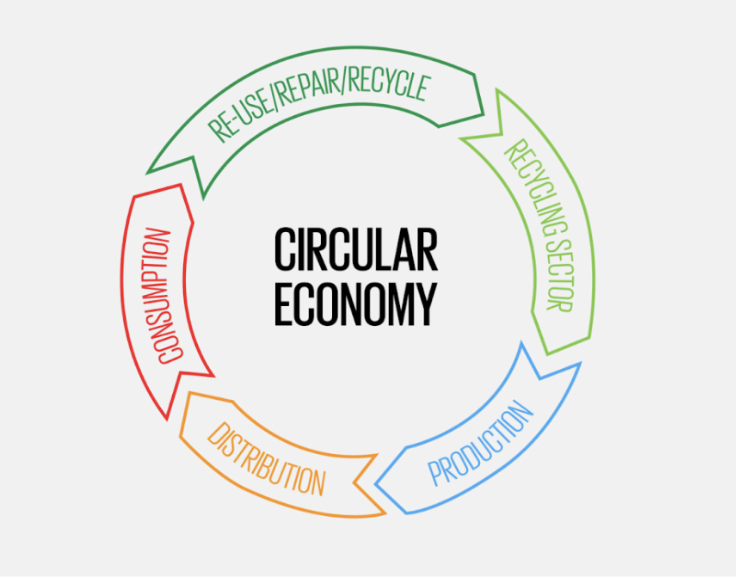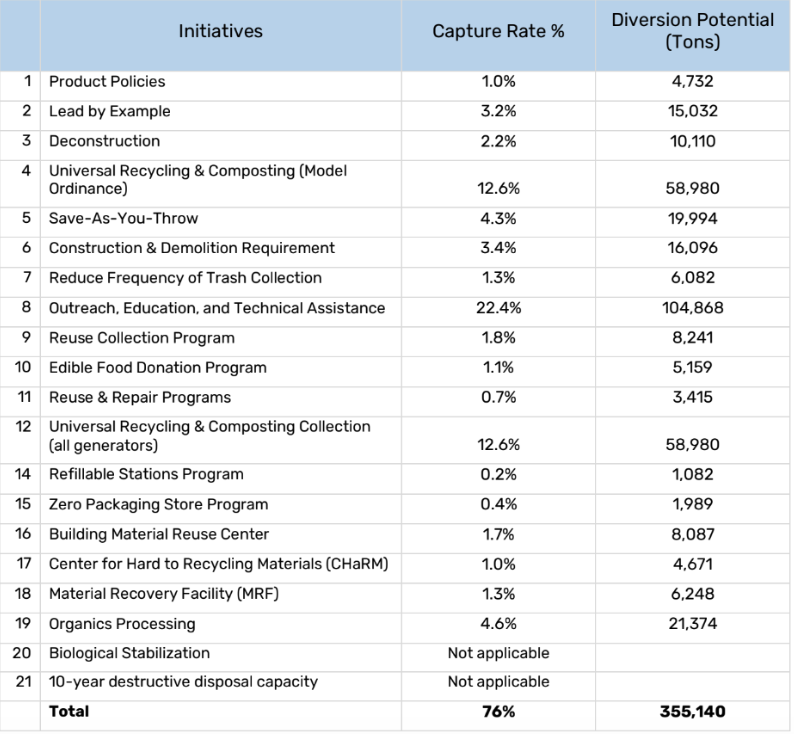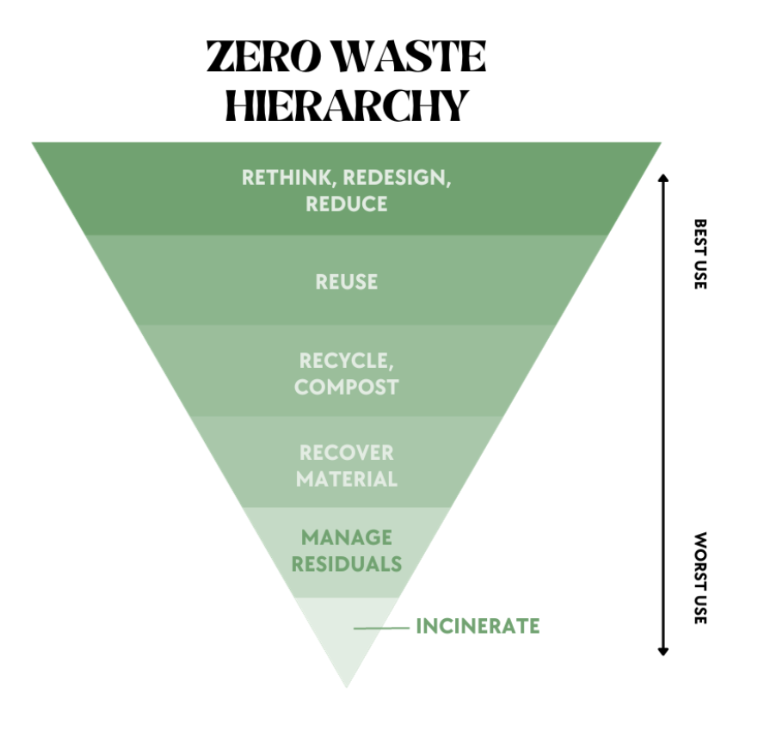ZERO WASTE
WHAT IS ZERO WASTE?
Zero waste is the conservation of all resources by means of responsible production, consumption, reuse, and recovery of products, packaging, and materials without burning and with no discharges to land, water, or air that threaten the environment or human health.
Zero Waste International Alliance
A zero waste system involves several elements, including decreased natural resource use, full commitment of government and society for a cultural shift, accountability of manufacturers for full life cycle of their products, and adoption of the methods of a zero waste lifestyle.
A zero waste lifestyle does not mean creating no waste–rather, it involves adopting a more thoughtful approach to waste. Recognizing where waste can be reduced, as well as leaning into sustainable waste management practices (reusing, recycling, reworking, composting, etc.) are both essential elements of this approach.
Another key idea in a zero waste system is that it is cyclical. This concept of circular economy refers to the use of ethically sourced materials in producing high quality goods that are meant to be used, reused, and reworked for as long an amount of time as possible. Under this economic system, waste is highly reduced because everything produced is transferred and used somewhere else, continuously.
This approach redesigns our systems and resource use to prevent wasteful and polluting practices. With an emphasis on creating new products out of previously used materials, natural resource use and pollution go down while local economies are supported.

Zero Waste is the logical and sustainable solution to address our waste crisis. As we look towards long-term solutions that will decrease the harmful health effects of our current waste disposal practices, Zero Waste programs are the opportunity create a cleaner, sustainable system that also increases jobs, and reduces costs to individuals and communities struggling to manage the escalating trash problem.
The road to Zero Waste is a gradual process – while the approach and term itself seems intimidating and challenging to achieve in a world surrounded by disposables and plastics, the Zero Waste program is feasible and already adopted by over 7,000 communities in the U.S with great success.
The road to Zero Waste is an intervention for our addiction to trash – it’s painful, uncomfortable and seems nearly impossible to envision an alternative to the habits we’ve been conditioned to know.
WHY IS ZERO WASTE RELEVANT FOR CHESTER?
The Reworld Incinerator, formally Covanta, located in Chester, PA is one of the country’s largest incinerators. Emitting the highest amount of particulate matter and the second highest amount of lead as compared to other like facilities, the incinerator is a severe threat to the health and well-being of Chester residents. For more information on the incinerator and its harmful effects, visit our Ban the Burn page.
Because of the direct correlation between increased waste and increased incineration, it is particularly important that those in and around Chester are aware of the zero waste system. But because the Reworld Incinerator collects waste from areas far outside of Chester, it is dually important that education about Zero Waste spread across communities and throughout the country.
Findings in the Delaware County Zero Waste Plan outlined that:
- Reworld Delaware Valley’s human health and environmental costs total $337/ton burned, compared to $144/ton for directly using Rolling Hills Landfill.
- Reworld Delaware Valley’s human health costs are 23 times higher than those of Rolling Hills Landfill.
- Reworld Delaware Valley’s climate costs are 69% higher than those of Rolling Hills Landfill
- Transportation impacts are insignificant relative to the impacts of incineration or landfilling and do not justify choosing incineration.
WHAT IS THE DELAWARE COUNTY ZERO WASTE PLAN?
Delaware County’s first sustainability plan, SustainDelco, emphasizes achieving zero waste by redirecting waste from landfills and incinerators. Currently, only 34% of the county’s waste is diverted. The plan adopts a holistic approach by focusing on internal County operations and community education.
Key goals include increasing diversion rates in County buildings to 50% and reducing waste tonnage by 50% over the next 5 years. This goal extends to all 49 municipalities in the county. Additionally, the plan aims to decrease County emissions by 20% from the 2019 baseline over the same period.

Initiatives include outreach/education projects, universal recycling/compost programs, and organics processing methods to divert food waste and organic material from incinerators and landfills. These initiatives are projected to raise the countywide diversion rate from 34% in 2020 to 84% over the next decade (2023-2033).
However, despite these efforts, a significant portion (around 70%) of waste incinerated in the Chester Incinerator comes from outside Delaware County. The county’s Sustainability Office acknowledges that shutting down the incinerator falls under the jurisdiction of the state of Pennsylvania. Nonetheless, they are committed to setting an example for other counties and advocating for improved regulations or closure of the incinerator through influencing the Department of Environmental Protection (DEP). This underscores the importance of engaging with the DEP to advocate for the well-being of Chester.
HOW TO BUILD A ZERO WASTE FUTURE?
Building a zero waste future begins with the strength and commitment of local communities. Here is a comprehensive list of initiatives that communities can embark on to pave the way for a zero waste society.

- Rethink, Redesign, Reduce:
- Advocate for the integration of sustainability principles into product design and manufacturing processes
- Promote the use of life cycle assessments to identify opportunities for waste reduction
- Support initiatives that promote minimal packaging and product design for disassembly
- Reuse:
- Implement policies that incentivize the reuse of products and packaging
- Support the development of local repair cafes and community swap events
- Encourage businesses to adopt reusable packaging and product refill stations
- Recycle, Compost:
- Establish comprehensive education and outreach programs to encourage participation in recycling and composting
- Invest in infrastructure for the collection, sorting, and processing of recyclable materials
- Promote backyard composting and community composting initiatives
- Recover Material:
- Support initiatives for the recovery of valuable materials from electronic waste (e-waste)
- Promote the establishment of community-based material recovery facilities
- Invest in research and development of advanced recycling technologies for challenging materials
- Manage Residuals:
- Utilize existing landfill capacity responsibly, with a focus on reducing reliance on landfills
- Implement waste-to-energy technologies that capture methane emissions from landfills
- Explore innovative methods for the safe disposal of hazardous waste materials
- Incinerate:
- Oppose policies and facilities promoting destructive disposal, including incineration
- Reject energy systems reliant on continuous discard production
- Promote alternative waste treatment methods such as anaerobic digestion and pyrolysis
REFRENCES & RESOURCES:
Please go to pages 64-70 for more information on Life Cycle analysis (incineration vs. landfills)
For more recylcing-related resources, please check out the Public Recycling Resources page by DEP.
